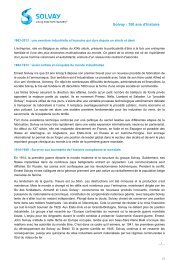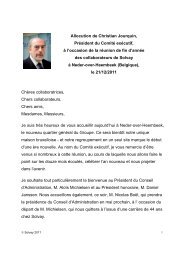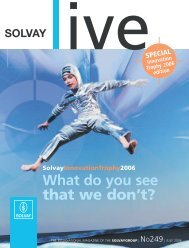Financial Statements - Solvay
Financial Statements - Solvay
Financial Statements - Solvay
Create successful ePaper yourself
Turn your PDF publications into a flip-book with our unique Google optimized e-Paper software.
142<br />
<strong>Solvay</strong> Global Annual Report 2008<br />
9. Not to have, either within the<br />
company or within a company or<br />
a person affi liated to it within the<br />
meaning of article 11 of the Companies'<br />
Code, a spouse or legally<br />
cohabiting partner, or parents or<br />
relations up to the second degree<br />
of kinship exercising a mandate<br />
of member of the management<br />
body, of member of the executive<br />
committee, of day-to-day executive<br />
manager or of member of senior<br />
management, within the meaning of<br />
article 19.2 of the law of September<br />
20, 1948 on the organization of the<br />
economy, or falling under one of the<br />
other cases defi ned in items 1 to 8.<br />
4.3.5. Appointment, renewal,<br />
resignation and dismissal of<br />
Directors<br />
The Board of Directors submits<br />
directors’ appointments, renewals,<br />
resignations or dismissals to the<br />
ordinary Shareholders’ Meeting<br />
for approval, after fi rst seeking the<br />
opinion of the Compensation and<br />
Appointments Committee, which is<br />
tasked with defi ning and assessing<br />
the profi l of any new candidate in<br />
respect of the criteria of appointment<br />
and of specifi c competences set by<br />
itself. The ordinary Shareholders'<br />
Meeting decides on proposals made<br />
by the Board of Directors in this area<br />
by a simple majority.<br />
When a directorship becomes vacant<br />
during a term of offi ce, the Board of<br />
Director may appoint a new member,<br />
subject to ratifi cation by the next<br />
following Ordinary Shareholders'<br />
Meeting.<br />
4.3.6. Frequency, preparation and<br />
holding of Board meetings<br />
The Board of Directors met nine<br />
times in 2008 (fi ve ordinary and four<br />
extraordinary meetings). Five ordinary<br />
meetings are planned in 2009.<br />
The dates of ordinary meetings are<br />
set by the Board of Directors itself,<br />
more than one year before the start of<br />
the fi nancial year. Additional meetings<br />
can, if needed, be called by the<br />
Chairman of the Board of Directors,<br />
after consulting with the Chairman of<br />
the Executive Committee.<br />
The agenda for each meeting is set<br />
by the Chairman of the Board of<br />
Directors after consulting with the<br />
Chairman of the Executive Committee.<br />
The Corporate Secretary is charged,<br />
under the supervision of the Chairman<br />
of the Board of Directors, with<br />
organizing meetings, and sending<br />
notices of meetings, agendas and the<br />
dossier containing the item-by-item<br />
information required for decisionmaking.<br />
To the extent possible, he<br />
ensures that directors receive notices<br />
of meetings and complete fi les at least<br />
fi ve days before the meeting.<br />
The Corporate Secretary prepares<br />
the minutes of the Board Meetings,<br />
presenting the draft to the Chairman<br />
and then to all members. Finalized<br />
minutes that have been approved<br />
at the following Board meeting are<br />
signed by all directors having taken<br />
part in the deliberations.<br />
The Board of Directors takes its<br />
decisions in a collegial fashion by<br />
a simple majority of votes. Certain<br />
decisions that are considered<br />
particularly important by the<br />
company’s by-laws require a threequarters<br />
majority. The Board may not<br />
validly transact its business unless<br />
half of its members are present or<br />
represented.<br />
Given the very high level of<br />
attendance, the Board of Directors<br />
has never been unable to transact its<br />
business.<br />
4.4. Evaluation and Training<br />
4.4.1. Evaluation<br />
Between the end of 2006 and the 1st<br />
quarter of 2007 the Board of Directors<br />
reviewed its own composition, modus<br />
operandi and the composition and<br />
modus operandi of the committees<br />
created by it. Board members were<br />
invited to express their views on<br />
these various points based on a<br />
questionnaire drawn up with the help<br />
of the Belgian Governance Institute,<br />
now under the name of GUBERNA.<br />
The Chairman of the Board of<br />
Directors has taken note of the results<br />
of this review. The next review will take<br />
place during 2010.<br />
4.4.2. Training<br />
An induction program is provided for<br />
new Directors, aimed at acquainting<br />
them with the <strong>Solvay</strong> group as fast<br />
as possible. The program includes<br />
a review of the Group’s strategy and<br />
its three sectors of activity and of the<br />
main challenges in terms of growth,<br />
competitiveness and innovation,<br />
as well as fi nance, research &<br />
development directions, human<br />
resources management, the legal<br />
context and the general organization<br />
of operations.<br />
This program is open to every Director<br />
who wishes. It also includes a visit to<br />
an industrial or research site.<br />
4.5. Committees<br />
4.5.1. Rules common to the<br />
various Committees<br />
The Board of Directors has set<br />
up three specialized Committees:<br />
the Audit Committee, the Finance<br />
Committee and the Compensation<br />
and Appointments Committee.<br />
These Committees do not have<br />
decision-making powers. They are<br />
advisory in nature and report to the<br />
Board of Directors, which takes the<br />
decisions. They are also called on<br />
to give opinions at the request of<br />
the Board of Directors or Executive<br />
Committee. After presentation to the<br />
Board of Directors, the Committees’<br />
reports are attached to the minutes<br />
of the next following Board meeting.<br />
All terms of offi ce on the three<br />
Committees are for two years.<br />
They are renewable.<br />
Committee members (except for<br />
Executive Committee members)<br />
receive separate compensation for<br />
this task.


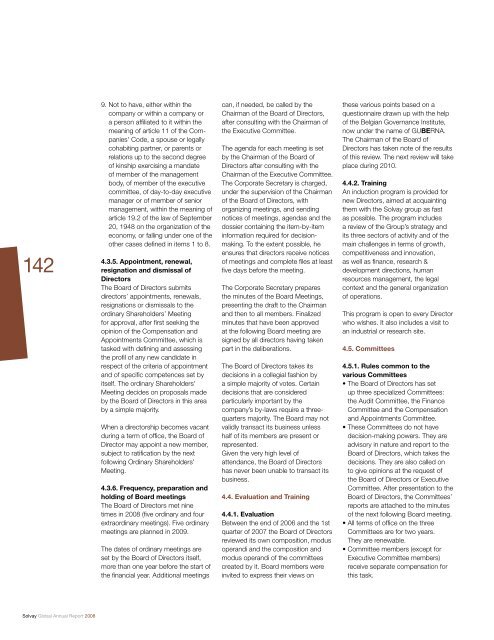

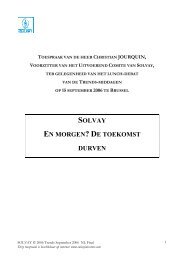
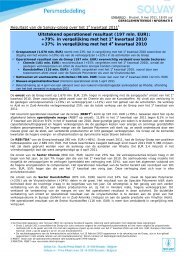
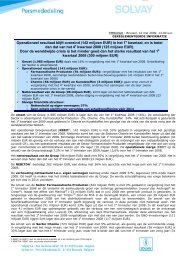

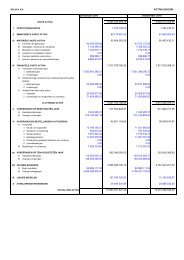

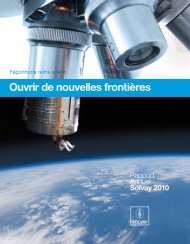
![PROC.1 [LETTRE] - Solvay](https://img.yumpu.com/16585746/1/184x260/proc1-lettre-solvay.jpg?quality=85)
